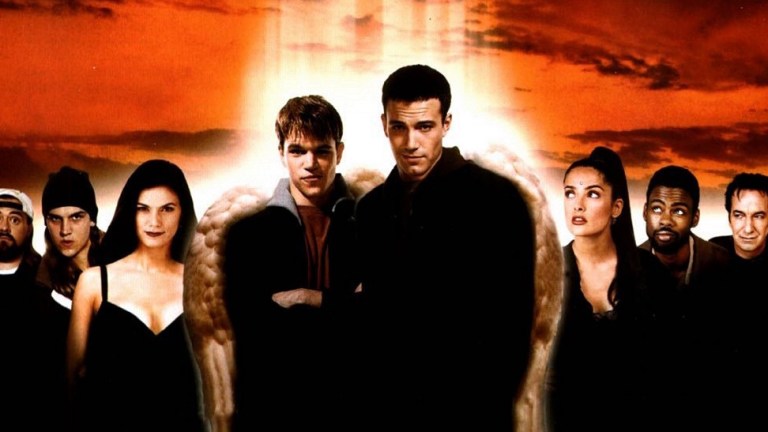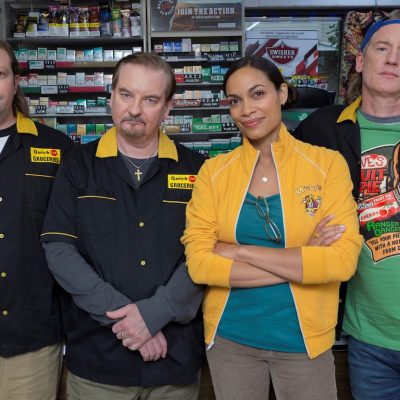Dogma Remains Kevin Smith’s Best Movie 25 Years Later
While not as celebrated as Clerks, Dogma remains Kevin Smith's most sophisticated and intriguing film to date. Most even miss it's kind of a superhero movie...

By the end of 1994, two filmmakers pointed to the future of cinema. One was Quentin Tarantino, whose sophomore feature Pulp Fiction made high-art out of lowbrow exploitation. The other was Kevin Smith, who famously funded his debut Clerks entirely on a credit card. With its vulgar dialogue and focus on the working class of the service industry, Clerks announced Smith as an exciting new talent, one who could capture the voice of a generation—Generation X, in particular.
Decades later, both Tarantino and Smith continue to work in the industry. But while at least some critics and audiences greet each of the former’s outings with praise, Smith’s latest films The 4:30 Movie (2024) and Clerks III (2022) go straight to streaming after playing a few special event screenings. Moreover, Smith is best loved today for his affable personality and appearances at comic cons and on podcasts. Smith loves superheroes with a passion that outdoes even the most frequent Den of Geek commentator, often posting pictures of his face, puffy from the tears, after watching a new MCU or DC movie. It’s an interesting twist when one speculates if people leaving Clerks in 1994 would have guessed Smith would become one of the most ardent supporters of the kind of blockbusters that prevent credit-card-funded indies from playing at Regals or AMCs.
But anyone watching his fourth feature in 1999 might have seen the shift coming. Part religious satire, part sincere declaration of faith, and fully a superhero-style adventure film, Dogma finds Smith at his peak, embracing all the high adventure that will come to define his later years with the dialogue-driven character work that made him popular in the first place. It is Smith at his crossroads and his quintessence.
Swear to God
Dogma begins with an image that perhaps best captures Smith’s worldview: that of God on the Jersey Shore, accosted by hockey players. One of them wears Hellboy on his jersey.
With God incapacitated, the demon Azrael (Jason Lee) makes his move, convincing disgraced Angel of Death Loki (Matt Damon) and his fellow outcast from the heavenly host, Bartleby (Ben Affleck), to take advantage of a popularity craving priest’s decree that anyone who passes through the gates of his parish will receive immediate forgiveness. If the duo passes through the gates and then immediately dies, they’ll go straight to Heaven, the very place that God declared they could never again enter.
Our only hope comes in Bethany (Linda Fiorentino), an apostate Catholic who now works at an abortion clinic. She also happens to be the last scion of Jesus Christ. Following the instructions of the Metron (Alan Rickman), the voice of God, Bethany—along with the unknown 13th Apostle Rufus (Chris Rock) and mainstays Jay and Silent Bob (Jason Mewes and Smith)—tries to prevent Loki and Bartleby from undoing Creation.
That’s a lot of plot, even in the simplified form above. And, by his own admission, Smith’s strengths lie in shooting dialogue, not action. Dogma has a lot of the sex-soaked dialogue that made Clerks, Mallrats, and Chasing Amy so quotable. Yes, Jay shouts “snoochie boochies,” but we also get Rickman sneering, “You humans. If there isn’t a movie about it, it’s not worth knowing, is it?,” or young Damon, with all his “aw schucks” charm, giggling while Loki admits, “I just like to fuck with the clergy, man.”
Expected as these moments might be, Dogma also includes plenty of straightforward dialogue about the nature of religion. The narrative stops from time to time so that Rufus or Serendipity the Muse (Salma Hayek) can rant about how organized religion made Christianity racist and sexist. On one hand, these declarations can get preachy, especially since Rock, Hayek, and Fiorentino struggle to deliver the more earnest dialogue. Fiorentino in particular suffers in part because she plays Bethany as a parody of Gen X cynicism, accentuating every line reading with a smirk, an eye roll, and (not or) a flutter of eye-lids. The actors seem to know that they’re browbeating the audience and can’t figure out how to make the lines into words their people would actually say.
That said, the clunkiness of these moments only underscore their sincerity. Amidst all the one-liners against various sex acts, the impulse to urge believers to use their faith as a way to accept and affirm others reads as sweet, if artless. One senses that Smith considers these declarations so important that he doesn’t even care that he’s undercutting his favorite part of his work by letting the banter suffer in order to get across the message.
Deadly Duo
While Rock, Hayek, and Fiorentino sometimes fail to make the material work, the rest of the cast shines. Jason Lee doesn’t have any of the menace that he’ll bring to supervillain Syndrome in The Incredibles five years later, but his flat sarcastic deliveries work for a scheming demon in a comedy. The always game Rickman never condescends to the material, and even if he does, he’s playing a condescending angel, so it only enhances the sneering. And the irony of casting George Carlin as a Catholic cardinal does most of the heavy lifting, making his fun line readings icing on the cake.
But the real appeal in Dogma is its central duo, Bartelby and Loki. Thanks to Good Will Hunting two years earlier, Affleck and Damon were America’s favorite best buds in the late ’90s, and they know how to channel that affection onscreen. Smith doesn’t need to do much more than hook the camera to a people mover and watch them banter back and forth, their charisma all the special effects the movie needs.
At first, it seems that Smith has cast the pals against type, with Affleck playing the reserved but compassionate Bartleby and Damon the more aggressive former Angel of Death. But as the film goes on and we learn about the pair’s backstory, the opposite turns out to be true. Loki is a true believer, whose frustration with God forced him to walk off the job centuries earlier. When he and Bartelby find a way back into Heaven, Loki immediately looks for ways to impress his old boss by smiting sinners, leading to a standout sequence in which he slaughters a boardroom full of thinly veiled Disney execs.
By putting two charismatic actors with great chemistry at the center of the destroy the world plot, Smith overcomes any of his deficiencies in shooting action. Yes, he has the budget to give them impressive wings and unimpressive groins (angels have no genitalia, we’re told and shown too often). But instead of trying to depict them flying around and wreaking havoc, Smith lets Affleck and Damon use their natural strengths as actors and sell the tension and terror.
In other words, Dogma does superhero stakes through a Clerks lens, making good guys and bad guys use their words instead of their fists.
The Heroes We Need
To be clear, not all of Dogma has aged well. Characters might declare God’s love for gay people, but that doesn’t prevent Smith from writing a few gay panic jokes. And flourishes such as a poop monster called the Golgothan take the crass jokes from words to visuals, making them literal and, therefore, purely juvenile.
Even in these missteps, however, Dogma becomes more interesting precisely because it feels like a superhero movie that would never get made today, not even if Ryan Reynolds looked at the camera and said something inappropriate. No, Dogma doesn’t match the MCU or even the DCEU for superhero visuals, but it does have humor and heart and an attention to character that Smith first demonstrated in Clerks, something that many movies, superhero or otherwise, have lost since 1999.


